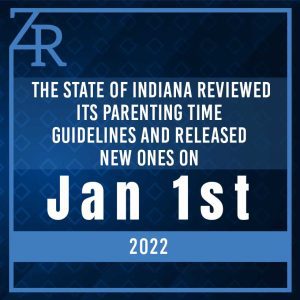Navigating parenting time guidelines can be challenging even under the best circumstances. But when you throw a public health emergency into the mix, it can get even more complicated.
 The COVID-19 pandemic created some unforeseen situations related to parenting time guidelines. For example, divorced parents had to figure out how to keep their children safe without violating court orders. As a result, the state of Indiana reviewed its parenting time guidelines and released new ones on January 1, 2022.
The COVID-19 pandemic created some unforeseen situations related to parenting time guidelines. For example, divorced parents had to figure out how to keep their children safe without violating court orders. As a result, the state of Indiana reviewed its parenting time guidelines and released new ones on January 1, 2022.
The new parenting guidelines rely on a shared parenting plan vs. a parallel parenting plan. In parallel parenting, each parent has responsibilities that don’t involve the other. Shared parenting includes cooperation and communication between the two parents. The new guidelines acknowledge that, in some cases, the relationship is too contentious to use this model. If you have any questions about parenting time in Indiana, a divorce attorney can guide you through the changes in the new guidelines.
Here are some of the key differences between the previous Indiana Parenting Time Guidelines and the new ones:
1. Modifying Parenting Time
Court orders are still enforceable during a pandemic, but the state also recognizes that situations such as public health emergencies can make it hard to comply. Therefore, parents can file a joint written agreement to modify existing custody and parenting time orders to accommodate public health changes.
If a parent misses time with their child due to circumstances outside their control, they can reschedule. These are the parameters for Indiana parenting time:
- If one parent needs to alter their schedule, they must notify the other ASAP.
- If they miss time, they can’t take away the other parent’s holiday time, parent special days, or previously scheduled events.
- They can make up any time they miss because they must work, are ill, or have military obligations.
- They can’t make up the time in blocks longer than three days.
There is a standard amount of time for non-custodial parents, but they can modify it because of:
- The child or parent
- The parent-child relationship
- The co-parenting relationship
- The child’s environment in each family’s home and extended family
2. Change in Deadline for Intent to Relocate
Previously, a parent who planned to move houses had to inform the other within 90 days. Now, it’s 30 days. The parent who is moving doesn’t have to let the other one know if the child won’t have to change schools, it brings the two households closer together, or it doesn’t create a distance greater than 20 miles.
3. Communication
Parents and their children have a right to communicate by telephone, text, email, or snail mail. The child should be able to have private conversations and communication without interference from the other parent. However, communications should be at reasonable times and for a reasonable length.
Parents can restrict phone, tablet, laptop, or other device use to punish the child. However, they must ensure that communication continues between the child and the other parent.
4. Pickup and Drop Off
The new parenting time guidelines also created uniform pickup and drop-off times for holidays and birthdays. Previously, many parents set their own times, which caused conflict. Parents can change those times if they both agree.
The parent spending time with the child should pick them up. The parent dropping them off should leave them at the residence entrance unless invited inside.
If the parents have a hostile relationship, they can drop them off at a public place or somewhere neutral. Both parents must be punctual and tell the other if they expect to be late.
Parents should minimize third-party involvement in the pickup and drop off to reduce conflict. For example, if your new spouse and ex-spouse have conflicts, leave your new spouse at home.
Zentz & Roberts: Helping Divorced Parents Navigate Parenting Time Guidelines and Custody
At Zentz & Roberts, we understand that the choices you make during a divorce will shape your life and that of your children for years to come. Our team provides compassionate, knowledgeable advice during a very stressful time. Contact us at 317-220-6056 to speak with one of our highly experienced Indianapolis family law attorneys.
***Please note: This page is not intended to give specific legal advice but is meant for information purposes only. Contact us to discuss your case***


